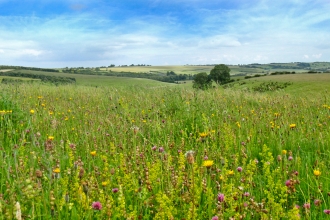Beebright
The Wild House of Beebright protects Lincolnshire's wildflower meadows and is symbolised by the bee. Bees are hardworking insects that pollinate many wild plants and many of the crops we eat as food. People have long revered bees linking them with magic, love, productivity and imagination. There are about 250 different species of bee in the UK, including 25 different species of bumblebee!
Wildflower meadows
Many areas of Lincolnshire, particularly upland areas like the Wolds, were managed as hay meadows for hundreds of years. Hay meadows were great places for livestock. Managed traditionally they were also wonderful places for wildlife. Wildflowers thrived in these places, providing nectar for many pollinating insects like butterflies, bees and moths, which in turn supported larger animals like birds and mammals.
Today
Since World War II agricultural intensification has meant the loss of this traditional landscape. 97% of Britain's wildflower meadows have disappeared. The few that remain have become extremely important for wildflowers like cowslips and bee orchids and the wildlife they support like the marbled white butterfly. Our road verges contain some of the most valuable grassland areas in Lincolnshire. Some of these are vestiges of old drove roads where livestock once grazed.
Beebright Protectors
If you have been chosen to be a Beebright Protector then your role is to promote awareness of wildflowers and wildflower meadows. Tell people about these rare places where wildlife still thrives and why we should save them. Why not manage a patch of your lawn as a mini-meadow for wildlife? Follow the Lincolnshire Wildlife Trust Facebook page to support nature conservation in Lincolnshire!
Click on the icon below to download your Beebright badge!




